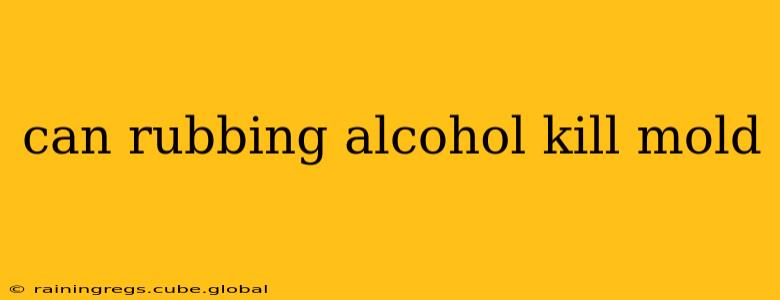Can Rubbing Alcohol Kill Mold? A Deep Dive into Mold Remediation
Mold. The word itself conjures images of damp basements, musty smells, and potential health hazards. Finding mold in your home is a serious concern, and many homeowners naturally turn to readily available household products for a quick fix. One common question is: can rubbing alcohol kill mold? The short answer is: yes, but with significant caveats.
Rubbing alcohol, or isopropyl alcohol, is a disinfectant effective against some types of mold and mildew. Its effectiveness, however, hinges on several factors, making it a less-than-ideal primary solution for mold remediation.
How Does Rubbing Alcohol Work Against Mold?
Rubbing alcohol works by disrupting the cell membranes of mold spores and hyphae (the thread-like structures that make up mold). This disruption leads to cell death and prevents the mold from spreading. It's a relatively inexpensive and readily available option, making it tempting to use for small mold problems.
What Types of Mold Does Rubbing Alcohol Kill?
The effectiveness of rubbing alcohol depends on the type and size of the mold infestation. It's generally more effective against surface mold, especially smaller colonies. For larger infestations or deeply embedded mold, rubbing alcohol is insufficient. It's crucial to note that rubbing alcohol won't eliminate the root cause of the mold problem; it merely addresses a symptom.
Is Rubbing Alcohol Effective for All Mold Problems?
No. Rubbing alcohol is not a suitable solution for extensive mold problems. Large mold infestations require professional remediation. Using rubbing alcohol on a large mold problem is akin to using a band-aid on a broken leg – it might provide temporary relief but won't solve the underlying issue and could even delay proper treatment.
What are the Limitations of Using Rubbing Alcohol for Mold Removal?
- Surface-Level Treatment: Rubbing alcohol only kills mold on the surface; it doesn't penetrate porous materials like drywall or wood. Mold roots can remain, leading to re-infestation.
- Ineffective Against Toxic Mold: Some mold species are toxic (e.g., Stachybotrys chartarum, or black mold). Rubbing alcohol is not powerful enough to effectively eliminate these harmful molds.
- Potential Health Risks: While generally safe for topical use, inhaling rubbing alcohol fumes can be harmful. Always ensure adequate ventilation when using it.
- Not a Long-Term Solution: Addressing the source of moisture that caused the mold problem is crucial. Failing to do so will likely lead to recurring mold growth regardless of the initial treatment.
What Should You Do Instead?
For small, superficial mold problems, a solution of bleach and water (1 part bleach to 10 parts water) can be more effective than rubbing alcohol. However, always test this solution in an inconspicuous area first to check for discoloration or damage.
For larger or more complex mold infestations, professional mold remediation is essential. Professionals have the expertise, equipment, and safety measures to safely and effectively remove mold, identify the source of the problem, and prevent future growth. They'll also take the necessary precautions to protect your health and prevent further damage to your property.
In Conclusion:
While rubbing alcohol can kill some surface mold, it's not a reliable or comprehensive solution for mold remediation. Its limited effectiveness, potential health risks, and inability to address the root cause make it unsuitable for anything beyond very minor mold problems. Always prioritize prevention, proper ventilation, and professional help when dealing with significant mold infestations. Your health and the structural integrity of your home are at stake.
